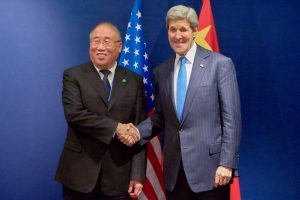China has tapped 71-year-old Xie Zhenhua, a familiar name in Beijing’s climate bureaucracy and diplomacy, to serve as special climate envoy. Xie previously served as China’s top representatives for climate negotiations from 2007 to 2018 – during which time he oversaw a landmark deal between the U.S. and China on climate change commitments. Xie’s return to the field is seen as a positive signal for U.S.-China cooperation over climate issues, as the Chinese negotiator is familiar with John Kerry, the Biden administration own climate czar.
“This is clearly tailored towards the US,” Li Shuo of Greenpeace China wrote in a tweet on Xie’s re-appointment. “I assume the ‘who should Kerry speak to’ question is answered.”
Xie’s career experienced all the ups-and-downs of U.S.-China climate change issues. In 2009, China’s delegation, led by Xie, was widely blamed by developed countries for stonewalling a comprehensive agreement at the 2009 Copenhagen climate conference. Two years later, at the 2011 conference in Durban, Xie went viral with a table-banging tirade in 2011 rejecting pressure for China to commit to emissions reductions.
But just a few years later, Xie played a crucial role in sealing a climate change agreement that saw the United States and China agree to emissions cuts together. That breakthrough paved the way for the Paris Agreement the following year. Notably, Kerry, who was the U.S. secretary of state at the time, was also a pivotal figure in both deals.
China’s journey to accept emissions cuts – and, in general, a larger responsibility in global climate change fights – was propelled by a number of factors: domestic anger over pollution, international pressure, and long-term economic planning that sees the renewables field as a golden opportunity. Xie is seen as a leading figure in helping push along Beijing’s changing stance on climate issues. Analysts and officials at home and abroad widely agree that he is personally committed to environmental protection. “[O]bservers, including former colleagues in government that asked not to be named, believe that the changes [in China’s climate policy] would have been unimaginable without Xie’s contribution,” Li Jing wrote for chinadialogue in 2019 in an article examining Xie’s legacy.
But it turns out Xie was still building his legacy even then. He stayed influential despite transitioning out of government to serve as head of the Institute of Climate Change and Sustainable Development at Tsinghua University in Beijing. According to a report from Bloomberg Green, Xie was the driving force behind the surprise announcement last fall that China will aim for net-zero emissions by 2060. The veteran diplomat “has done more than anyone else outside Xi’s ruling circle to position China as a global climate leader,” in Bloomberg’s words.
Xie’s appointment was thus a welcome sign of China’s willingness to engage, particularly with the U.S., on climate issues. In late January, Chinese Foreign Ministry spokesperson Zhao Lijian made headlines by suggesting that U.S.-China cooperation on climate would be limited by disagreements in other areas. “I’d like to stress that China-U.S. cooperation in specific areas, unlike flowers that can bloom in a greenhouse despite winter chill, is closely linked with bilateral relations as a whole,” Zhao said in a press conference when asked about the prospects. “China has emphasized time and again that no one should imagine they could ask China to understand and support them in bilateral and global affairs when they blatantly interfere in China’s domestic affairs and undermine China’s interests.”
Xie, however, took a more moderate tone in comments at the China Tibet Trans-Himalaya Forum for International Cooperation on February 3, where news of his new role reportedly began making the rounds. “We need to uphold multilateralism and global cooperation to address the problem,” Xie said at the forum, according to Global Times. He added, “We are willing to continue policy dialogue and practical cooperation with other parties including the U.S. in the climate change field.”
































